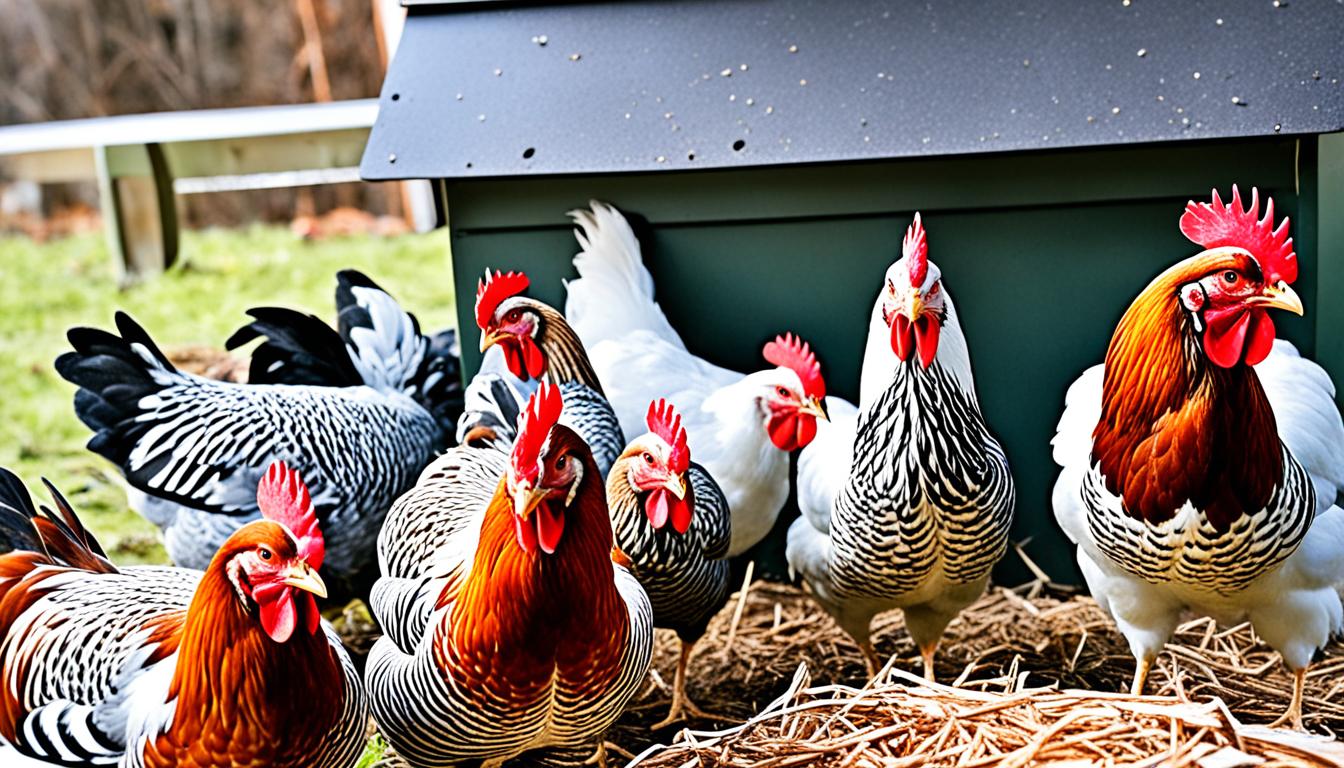Many wonder if a rooster is needed for hens to lay eggs. The answer is no, hens can lay eggs on their own. This idea that a rooster is needed comes from thinking it helps stimulate egg-laying in hens. Naturally, hens will lay eggs whether a rooster is there or not.
Remember, without a rooster, the eggs hens lay are infertile. They can’t grow into chicks. However, the act of hens laying eggs doesn’t require a rooster. But, if you want baby chicks and to grow your flock, a rooster is needed to fertilize the eggs.
Key Takeaways:
- Hens can lay eggs without a rooster present.
- Without a rooster, the eggs are infertile and will not develop into chicks.
- A rooster is necessary if you want to hatch chicks and grow your flock.
- Roosters play a vital role in fertilizing eggs and allowing for potential hatching.
Reasons for Having a Rooster in a Flock
A rooster isn’t a must for eggs, but many keep them for various reasons. Mainly, roosters are key for egg fertilization, useful in breeding and hatching chicks. Without a rooster, eggs won’t hatch into chicks.
Roosters also have a protective role. They guard the flock, warning of enemies and keeping hens safe. Their sharp senses and bold demeanor are excellent for protection. Furthermore, they help keep the peace in the flock, reducing fights among hens.
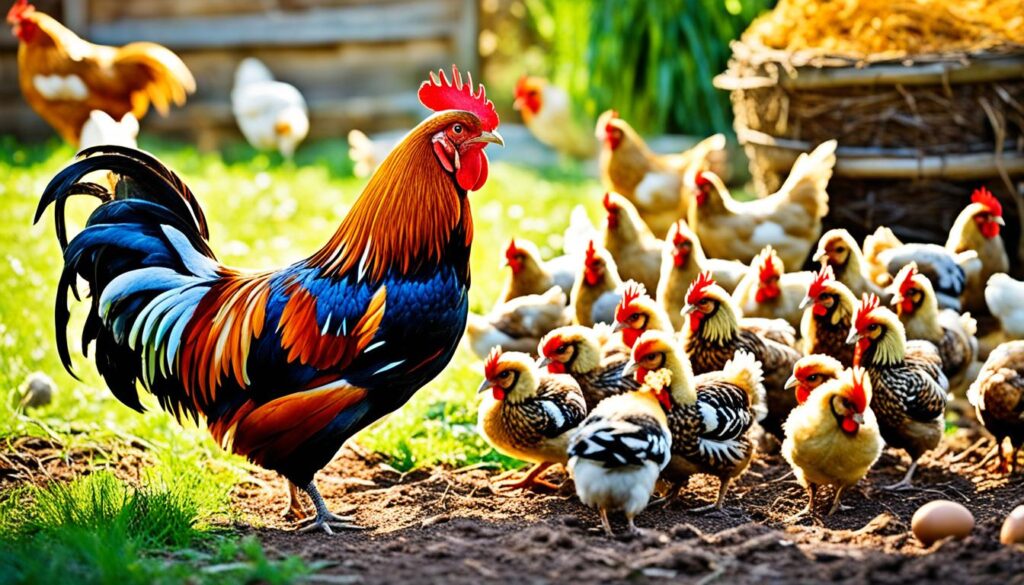
Yet, remember that keeping a rooster might not be allowed in some places like cities. This is due to concerns over their loud crowing. Local laws might say you can’t have a rooster to avoid bothering your neighbors.
If you’re thinking about getting a rooster, make sure you have enough hens. It’s best to have about 6 hens for each rooster to avoid problems. This way, everyone in your flock can be happy.
Roosters can be a big plus, but they do come with challenges. Sometimes, a rooster may be too aggressive, which can hurt hens. Yet, this doesn’t happen too often. My experience of owning roosters for 15 years has shown that most are friendly.
Rooster Egg Production and Protection
Having a rooster can truly add to your flock. They are essential for hatching eggs and play a significant role in the flock’s growth. Roosters also protect the group, risking their lives for the hens. They warn of danger with their crow, keeping everyone safe.
Although roosters can be tough to handle, good care will lead to a happy flock. They make significant contributions and their efforts in protecting the flock are commendable.
Considerations for Keeping a Rooster
Before deciding on a rooster, think about the noise they make. Roosters are famous for their constant crowing. This could lead to problems with neighbors or local laws. Many places have rules against keeping roosters because of their loud sounds.
Roosters can also be aggressive, especially as they get older. They might fight with others, including humans. Keeping an eye on them and teaching them good behavior is very important to avoid trouble and injury.
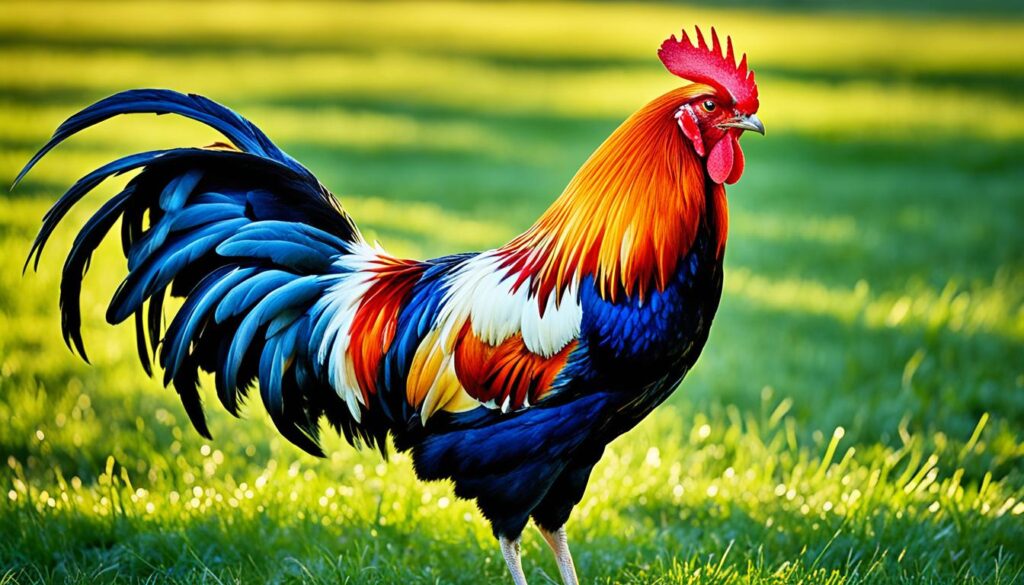
Roosters have special needs that you must consider. Some may suggest castration or other methods to control bad behavior. But these can come with their own problems and the RSPCA isn’t in favor of them.
It’s key to care for roosters the same way you do for any chicken. Regular check-ups and handling spurs, if needed, are important. Roosters can also play positive roles like stopping bullying and making training easier for all.
Having a rooster can add a lot to your flock. They’re interesting to watch, and they lead the hens like in the wild. But, you should watch out for issues like fighting and their effects on the hens.
It takes careful thought to decide on a rooster. But, with good care, they can bring joy and balance to your flock.
Challenges of Controlling Rooster Behaviors
Keeping a rooster in your flock can be tough. It’s hard to stop them from crowing and being mean. To handle loud crowing, some suggest using dim lights or special collars. But these tricks might not work well and could hurt the rooster.
Dealing with an aggressive rooster needs observation and fast action. Roosters can be picky about their space, even fighting other roosters or people. Making sure the rooster is okay and that the flock is safe is key.
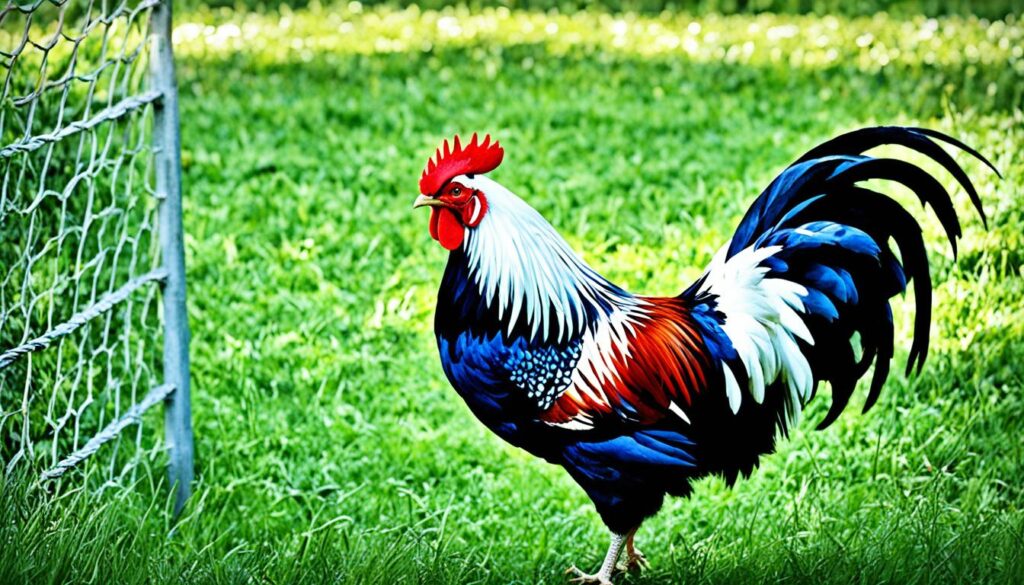
Roosters, though, just naturally crow. It’s how they talk about dangers or show off their area. You can cut down on their crowing by keeping their area quiet and relaxing. A happy rooster is less likely to crow too much.
When a rooster starts to get mean, it’s time to act. Rooster tempers can flare because of things like too many birds in one place. Spring and young roosters are when it gets really bad. So, know that space and time of year matter a lot.
Experts can help you handle a rowdy rooster. They might tell you to act big by waving your arms. Being calm and firm is also important. Teach your rooster to respect you without getting into fights.
Protect yourself from aggressive roosters. Wear sturdy boots and have a tool handy. This will keep you safe in case the rooster gets too rough.
Summing up, managing roosters is hard work. It’s about understanding them and using smart ways to keep peace in the flock. This makes life better for the rooster and everyone else.
Alternatives to Keeping a Rooster
If a rooster isn’t right for you, consider getting hens. They lay eggs without a rooster. This makes them a great addition to any backyard flock.
When you get hens, make sure they’re female. You can do this by buying hens that are almost ready to lay eggs. That way, you avoid getting roosters by mistake.
If any roosters hatch, think about finding them a new home. You can give them to rescue groups. This keeps your flock happy and peaceful with just hens.
Image related to Alternatives to Keeping a Rooster
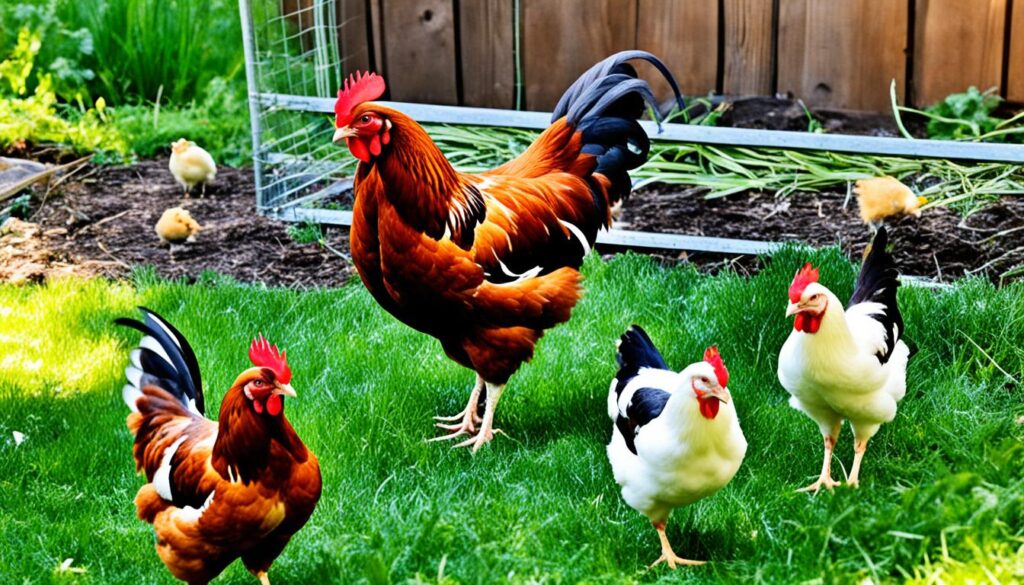
Choosing hens over roosters means your backyard will still be productive. You can keep hens only or have a mix. There’s a choice that fits what you want.
Caring for Roosters in a Flock
Choosing to keep roosters in a flock means looking after them well. They are key for a peaceful flock. But, you must meet their specific needs with care.
Managing roosters’ spurs is important. These can grow long and hurt other birds or people. If spurs are causing issues, get a vet to remove them safely.
Roosters’ well-being includes their diet and living conditions. They need a good diet for health and space to move and behave naturally. Remember, each rooster needs 3 square feet inside and 10 outside in their coop.
Roosters thrive on social interactions. Allowing them to form their pecking order reduces fights. It’s good to keep roosters and hens separate for harmony.
Adding new roosters to a flock should be slow and cautious. They must see and hear each other, but be protected by a fence. This method eases them into the group without conflict.
Make sure to watch roosters for any signs of aggression or fights. Remove any roosters that are too aggressive quickly. This step is crucial for keeping the flock safe for everyone.
Overall, looking after roosters is about understanding their needs and managing their behavior well. With the right care, roosters contribute to a peaceful and happy backyard flock.
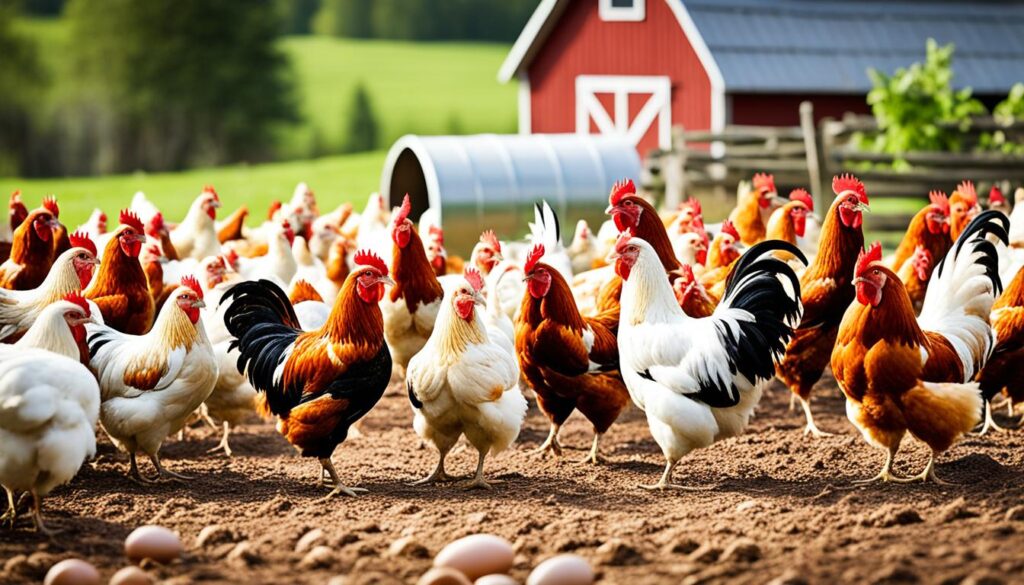
Conclusion
Roosters aren’t needed for hens to lay eggs. Hens will lay eggs every day or so, even without a rooster. The eggs they lay are fine for eating, whether a rooster is around or not.
Having a rooster, though, does offer some pluses. A rooster helps keep the peace and guards the hens. It makes sure every hen gets to eat and stays safe.
But, roosters can also be a handful. They can be noisy, fight with other roosters, and upset neighbors. Dealing with these issues takes thought to handle them kindly.
Choosing not to have a rooster can mean fewer problems. It can make your place quieter and less tense. Plus, eggs can last longer without a rooster being there.
In sum, while not a must, roosters do add something special. Still, make sure you think about the challenges. Always put the welfare of the animals first. And remember, there are other options, like just having hens.
